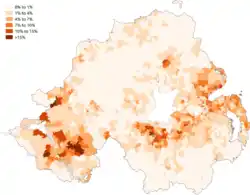
Irish Church Records (Methodists) refers to the records produced by the Methodist Church in Ireland between the late 1740s when the founder of the Methodist movement, John Wesley, first visited Ireland, down to the present day. Although it is often overlooked, the Methodist Church has formed a significant enough part of the religious landscape of Ireland since the mid-eighteenth century, with approximately 50,000 Methodists in Ireland in the early twenty-first century worshipping through over 200 different congregations. From the late 1740s onwards Methodist records were produced to record where members of the church were baptized, married or buried. Thus, church records pertaining to the Methodists form a key genealogical resource for studying the birth, life and death of adherents of Methodism in Ireland over the last 275 or so years.[1]
Research your ancestors on MyHeritage
History of the Methodist Church in IrelandHistory of the Methodist Church in Ireland

Methodism is one of just scores of different branches of Protestantism and other forms of Christianity which emerged in England and other European countries, and in North America, in the seventeenth, eighteenth and nineteenth centuries. The founder of this particular movement was John Wesley. Wesley was an English evangelist born in Lincolnshire in 1703. He first became an Anglican minister within the state Church of England before dabbling in the church of the Moravian brethren. Dissatisfied with elements of each of these Christian branches, in 1738 he experienced an evangelical awakening and decided to establish his own congregation. The Wesleyan theology emphasized the ability of all individuals to find salvation and sanctification through their conduct in the world, something which challenged many established Protestant doctrines which laid greater emphasis on the idea that god has pre-ordained those who will achieve salvation. Wesley laid emphasis on ritualistic Christian worship as the means by which to acquire salvation. This was perceived to be an extremely methodical approach to Christian worship, hence the later designation of the branch of Christianity that Wesley founded as Methodism.[2]
Wesley travelled extensively during his life, founding new churches and spreading his message. He visited Ireland on more than twenty occasions between 1747 and 1789, setting up what would come to be understood as the first Methodist Church in Ireland in the capital city, Dublin, on Whitefriar Street in 1752. Because Wesley also maintained that his was not a non-conformist branch of Protestantism, but was instead operating within the Church of England and the Church of Ireland, Methodists did not experience official persecution in Ireland in the manner which Presbyterians and other non-conformist groups did in the eighteenth century. Consequently, numerous Methodist churches were able to flourish, gaining a particularly strong foothold in the north of the island in the city of Belfast, which was experiencing a boom as a thriving center of the linen industry in the first decades of the Industrial Revolution.[3]
By the time Wesley died in 1791, there were an estimated 14,000 Methodists in Ireland. His movement continued to grow into the nineteenth century as the Methodist church prioritized training its clerics in the Irish language, allowing them in the process to proselytize amongst the Irish at a time when nearly a million Irish people were still monolingual Irish speakers. There were 30,000 Methodists in Ireland by the end of the Napoleonic Wars in 1815.[4] The number continued to grow steadily in the decades that followed and Irish Methodists began playing a role in their missionary efforts abroad by the late nineteenth century. Irish independence and partition in the early twentieth century ensured that Methodism became primarily associated with Northern Ireland as the number of Methodists in the Irish Free State after the Irish War of Independence and the Republic of Ireland that followed declined. There are roughly 60,000 Methodists island-wide today.[5]
Where to find Irish Methodist church recordsWhere to find Irish Methodist church records

Methodist congregations in Ireland tended to keep their own records individually and there was no central repository at which they were deposited in Ireland. However, in an awareness of the need to have such records available in centralized archives for genealogical studies and research projects, many Methodist congregations have deposited their records in recent decades at the Methodist Historical Society of Ireland’s Archive and Library at Edgehill House in the city of Belfast. This includes records for both Northern Ireland and the Republic of Ireland.[6] A wide range of these records have also been microfilmed or digitized and are available in those formats at institutions such as the Public Records Office of Northern Ireland. Inevitably, some Methodist church records are still held by individuals congregations. The Methodist Church in Ireland’s website provides a directory of contacts for Methodist churches in Ireland, which can be contacted to obtain records therefrom.[7]
What can be found in Irish Methodist church recordsWhat can be found in Irish Methodist church records
Irish Methodist church records generally comprise the standard records one finds within Christian churches, namely baptismal, marriage and death records. In this instance, baptismal records only exist from 1816 onwards when Methodist congregations began performing baptisms in their chapels and preaching houses. Methodist marriage records only become available from 1863 onwards following the passage of the Registered Separate Buildings Act in Ireland. Finally, burial or death records are much scarcer for Irish Methodist churches as very few Methodist meeting houses or chapels had cemeteries or burial sites attached to them and so were limited in their ability to carry out burials in Ireland. Despite these limitations, Methodist church records are a useful genealogical resource for anyone wishing to trace the details of an ancestor who was a Methodist in nineteenth- or twentieth-century Ireland.[8]
See alsoSee also
Explore more about Irish Methodist church recordsExplore more about Irish Methodist church records
- Baptists, Methodists and Presbyterians – Oh, My! at Legacy Family Tree Webinars
- Using Church Records to Identify Ancestors at Legacy Family Tree Webinars
- Townlands, Parishes and Baronies – understanding land administrative divisions in Ireland at Legacy Family Tree Webinars
References
- ↑ https://irishmethodist.org/
- ↑ https://epwortholdrectory.org.uk/family/john-wesley/
- ↑ David Hempton, ‘Methodism in Irish Society, 1770–1830’, in Transactions of the Royal Historical Society, Vol. 36 (1986), pp. 117–142.
- ↑ https://dmbi.online/index.php?do=app.entry&id=1471
- ↑ Norman W. Taggart, The Irish in World Methodism, 1760–1900 (Dublin, 1986).
- ↑ https://methodisthistoryireland.org/irish-methodist-baptismal-and-marriage-records/
- ↑ https://irishmethodist.org/find-a-church
- ↑ https://methodisthistoryireland.org/irish-methodist-baptismal-and-marriage-records/

